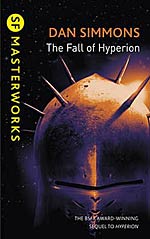
![]() verkisto
verkisto
7/26/2016
![]()
When I was going through and organizing all of the books to read in my Unfinished Series project, I decided to read them in reverse chronological order. This is my last series, so this is also the series that I've gone the longest without reading -- close to twenty years. I remember reading it, but I didn't remember much about the book as I went into it. I also remember not liking it that much, because it was so different from the book Hyperion was. Now I realize that Hyperion was just the foreword to the real story, which is this novel.
Hyperion was a brilliant novel in a lot of ways, but all it told us was why the pilgrims were on their pilgrimage (while also doing an outstanding job of building the world of the story without you even realizing he's doing it). The Fall of Hyperion goes beyond the lives of the pilgrims, and tells us of the war that just barely begins in the first novel, telling us why it's happening, how it's happening, and what it means for the universe. It's complex, though not convoluted, and it tells us all it needs to tell us without beating us about the head with the point. It's peppered with literary allusions, not the least of which is having a reanimated version of John Keats narrating about a third of the novel.
It's hard to talk specifics of the novel, because it has so much detail, but it doesn't help that it relies so much on the reader having read the first book in the series. I initially thought that this book and its predecessor would really be a single book in two volumes, but Simmons included enough summaries to help remind the readers of what came before that it really does feel like a sequel. Given how different the two books are in structure and style, though, they don't pair together that easily. Hyperion is the story of people and their motivations; The Fall of Hyperion is much grander than that.
This series is one that shouldn't be missed, especially for fans of science fiction. It goes above and beyond pulp sci-fi, and challenges the reader with heavy themes and complex storylines. I'm somewhat apprehensive about finishing off the series (the second diptych of novels was published many years after the first, and is set so far in the future that it strikes me as more a continuation of that world than an actual sequel), but if there's one thing I've learned from reading Dan Simmons, it's that I can trust him to tell a good story.